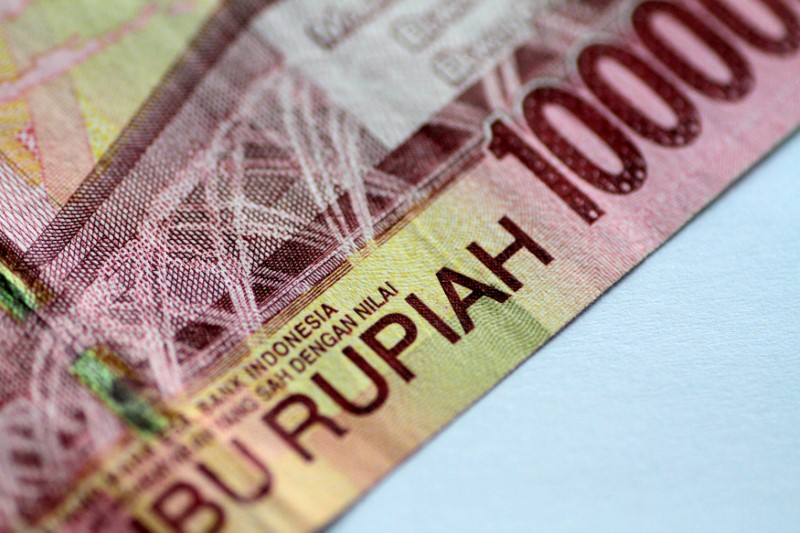* Long bets cut on Asian FX on dollar resilience- poll
* Malaysia's economy posts biggest annual decline since 1998
crisis
* Philippine c.bank keeps rates steady as expected
* Most markets closed on Friday for Lunar New Year
By Shruti Sonal
Feb 11 (Reuters) - Most emerging Asian currencies had
marginal gains on Thursday as the dollar slipped to a two-week
low following soft U.S. inflation data, while equities were
muted due to light trading as the Lunar New Year holidays began.
The Singapore dollar SGD= , Indian rupee INR=IN and the
Indonesian rupiah IDR= all rose 0.1%, even though volumes
remained thin.
The dollar was pinned near two-week lows, with
softer-than-expected U.S. inflation and the Federal Reserve
vowing to keep interest rates low weighing on the greenback.
FRX/
News that India and China have agreed to pull back troops
from a bitterly contested lake area high in the western
Himalayas after a months-long standoff also aided the rupee,
Rahul Gupta, Head Of Research-Currency at Emkay Global Financial
Services, said. Philippine peso .PSI was largely unchanged after the
central bank held rates in a widely expected move, adding that
current monetary policy settings were appropriate as inflation
is still expected to stay firmly within target. Meanwhile, a Reuters poll showed long positions on most
Asian currencies were scaled back as investors grappled with
unexpected resilience in the U.S. dollar at the start of the
year. On the equities front, investors treaded cautiously, with
China, Japan, South Korea and Taiwan all on holiday, while
Malaysia and Singapore had shortened trading hours. Most markets
in the region will be closed on Friday.
Broader Asian shares rested at record highs as investors
digested recent meaty gains and hoped for more global stimulus,
with MSCI's broadest index of Asia-Pacific shares outside Japan
.MIAPJ0000PUS up 0.1%. MKTS/GLOB
Malaysian benchmark .KLSE pared gains and closed 0.2%
higher, having gained as much as 0.4%, as its economy fell at a
faster-than-expected pace in the fourth quarter and posted its
worst annual performance since the 1998 Asian Financial Crisis.
Cushioning the blow, Bank Negara Malaysia governor Nor
Shamsiah Mohd Yunus said growth will rebound going into 2021.
Analysts too mirrored the expectation for a recovery.
"Despite the lingering domestic challenges and uneven
recovery, we expect the growth trajectory to improve from 2Q21
onwards aided by a low base effect, further improvement in the
global economy, and gradual normalization in domestic activity",
said Julia Goh, a senior Malaysia economist for UOB.
"Malaysia's vaccination program that is slated to begin in
early March, as well as ongoing fiscal and monetary support will
help to lift sentiment and growth".
Highlights:
** Singapore's 10-year benchmark yield is down 2.6 basis
points at 1.023%
** Top losers on Thailand's SETI .SETI include Union
Plastic PCL UP.BK ; TU Dome Residential Complex Leasehold
Property Fund TU-PFu.BK ; AJ Advance Technology PCL AJA.BK
down -7.14% at 0.13 baht
Asia stock indexes and currencies at
0743 GMT
COUNTRY FX RIC FX FX YTD INDEX STOCKS STOCKS
DAILY % DAILY YTD %
% %
Japan JPY= +0.02 -1.25 <.N22 0 7.72
5>
China
India INR=IN +0.09 +0.41 <.NSE 0.06 8.11
I>
Indonesia IDR= +0.11 +0.54 <.JKS 0.11 3.84
E>
Malaysia MYR= +0.04 -0.51 <.KLS 0.16 -1.71
E>
Philippines PHP= -0.01 -0.06 <.PSI -1.29 -2.08
>
S.Korea
Singapore SGD= +0.15 -0.26 <.STI -0.01 2.87
>
Taiwan TWD=TP +0.00 +0.33 <.TWI 0 7.26
I>
Thailand THB=TH +0.00 +0.20 <.SET -0.62 4.01
I>
